Based on Your Reading:
Get Your Free Mesothelioma Guide

Find a Top Mesothelioma Doctor

Access Help Paying for Treatment

After several decades of harmful exposures to asbestos, asbestos lung cancer emerged as a lasting burden on the state of New York. Weak safety constraints at asbestos-heavy work sites and illegal asbestos disposal procedures have placed a vast number of New Yorkers at risk for not only lung cancer but also mesothelioma, asbestosis and other chronic respiratory illnesses.
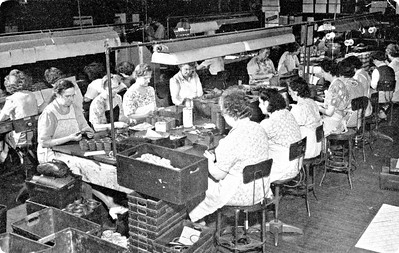
Written by Suzanne Dixon, MPH, MS, RDN • Edited By Walter Pacheco • Scientifically Reviewed By Arti Shukla, Ph.D.
The Mesothelioma Center at Asbestos.com has provided patients and their loved ones the most updated and reliable information on mesothelioma and asbestos exposure since 2006.
Our team of Patient Advocates includes a medical doctor, a registered nurse, health services administrators, veterans, VA-accredited Claims Agents, an oncology patient navigator and hospice care expert. Their combined expertise means we help any mesothelioma patient or loved one through every step of their cancer journey.
More than 30 contributors, including mesothelioma doctors, survivors, health care professionals and other experts, have peer-reviewed our website and written unique research-driven articles to ensure you get the highest-quality medical and health information.
My family has only the highest compliment for the assistance and support that we received from The Mesothelioma Center. This is a staff of compassionate and knowledgeable individuals who respect what your family is experiencing and who go the extra mile to make an unfortunate diagnosis less stressful. Information and assistance were provided by The Mesothelioma Center at no cost to our family.LashawnMesothelioma patient’s daughter


Dixon, S. (2023, June 19). Asbestos Lung Cancer in New York. Asbestos.com. Retrieved April 16, 2024, from https://www.asbestos.com/cancer/lung-cancer/new-york/
Dixon, Suzanne. "Asbestos Lung Cancer in New York." Asbestos.com, 19 Jun 2023, https://www.asbestos.com/cancer/lung-cancer/new-york/.
Dixon, Suzanne. "Asbestos Lung Cancer in New York." Asbestos.com. Last modified June 19, 2023. https://www.asbestos.com/cancer/lung-cancer/new-york/.
Records from the New York State Department of Health show there were 4,220 new cases of lung cancer in 2014.
However, isolating exactly how many of these cases can be attributed to asbestos exposure is difficult. Occupational data indicates a significant number of asbestos-exposed workers who are also smokers, which makes it challenging to determine whether a patient’s lung cancer was triggered by smoking or asbestos.
That doesn’t take away from the fact that New York has many work sites in which asbestos is a concern. According to the U.S. Centers for Disease Control and Prevention, 4-12 percent of all lung cancers arise after occupational exposures to asbestos. This amounts to between 8,400 and 25,200 cases of asbestos lung cancer diagnosed in the United States each year.
Thousands of people who developed asbestos-related diseases filed lawsuits in New York to seek compensation for being exposed. Defendants in the cases are companies that failed to warn or protect the public from the health risks associated with asbestos exposure. In some cases, judges consolidate multiple plaintiffs with similar asbestos claims into a single lawsuit. As a group, the plaintiffs can seek compensation from upwards of 20 defending companies.
In addition to ample legal options, New York is a leading destination for lung cancer treatment. The fifth-ranking state for incidences of asbestos-related disease, New York boasts some of the nation’s most prestigious lung cancer treatment centers. These facilities are staffed by world leaders in the treatment of occupational diseases.
The vast majority of New Yorkers diagnosed with asbestos-related lung cancer were exposed to the toxic mineral while on the job. Asbestos insulation was used in the construction of buildings – office spaces and vendor locations for millions of New Yorkers – for decades. Asbestos still can be found within the walls of many aging New York structures.
Oftentimes, when dilapidated New York buildings require demolishment or repair, construction workers must handle and dispose of toxic asbestos building materials. Although state and federal safety regulations help protect workers and the general public from asbestos exposures, careless individuals sometimes illegally dispose of asbestos to save time or money.
In the state of New York, only licensed contractors are authorized to manage asbestos projects. Fraudulent contractors typically hire untrained workers for asbestos removal jobs, which seriously threatens the health of the workers and anyone else exposed to asbestos dust. If state or government officials observe such violations, hefty fines and prison sentences typically follow.
In 2004, for example, father and son owners of AAR Contractors Inc. were fined more than $75,000,000 for illegally disposing of asbestos removed from 1,550 New York buildings. Further, they received the longest documented prison sentences for environmental crimes in the United States to date. Alexander Salvagno, was sentenced to 25 years in prison. His father, Raul Salvagno, was sentenced to 19.5 years.
The asbestos in these facilities are usually fine unless they are disturbed or uncovered. Renovations, demolitions and other activities that disturb the asbestos can release airborne fibers. These fibers have been linked to the development of serious respiratory illnesses, including lung cancer, mesothelioma and asbestosis. Following the 9/11 terrorist attacks on the World Trade Center, for example, exposure among rescue and cleanup workers was a major concern, as the material was used extensively in the Twin Towers.
Get Your Free Mesothelioma Guide

Find a Top Mesothelioma Doctor

Access Help Paying for Treatment

Workers at countless job sites within the state of New York experienced harmful workplace exposures to asbestos. The majority of the state’s asbestos lung cancer patients developed the disease after being exposed to the toxic mineral on the job, most commonly while working in prominent New York industries like shipbuilding, manufacturing and power generation.
These industries incorporated asbestos heavily in both building materials and products, namely for the mineral’s value as an affordable and effective insulator from fire, heat, chemicals and electricity. Although medical researchers conclusively identified a link between asbestos exposure and the onset of various cancers by the 1960s, virtually all buildings constructed prior to 1980 furnished varying amounts of asbestos materials.
A 2021 report in the Archives of Environmental & Occupational Health discussed potential regulation concerns after sampling asbestos from a historic Staten Island asbestos mine. The anthophyllite asbestos produced longitudinal splitting making it consistent with anthophyllite asbestos mined in Finland associated with lung cancer and mesothelioma.
After the terrorist attack on the World Trade Center in Manhattan on Sept. 11, 2001, hundreds of tons of airborne asbestos fibers descended upon Lower Manhattan. This put workers involved in rescue, recovery and cleanup efforts at risk for a number of serious respiratory diseases including lung cancer.
Asbestos lung cancer patients in New York have access to a range of options for treatment. Because the state is home to some of the nation’s leading lung cancer doctors and treatment centers, you should take several key factors into consideration before choosing the facility best suited for your unique situation.
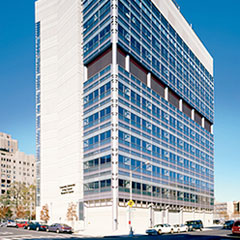
The New York-Presbyterian is a world-renowned medical center comprised of two leading cancer treatment centers. The Herbert Irving Comprehensive Cancer Center is recognized by the National Cancer Institute as an NCI-designated Comprehensive Cancer Center, indicating the facility’s excellence in cutting-edge cancer research, education and patient care. Specialists at the Weill Cornell Cancer Center share the same dedication to cancer care, and conduct a wide range of clinical research to improve current lung cancer treatments while perfecting new and advanced therapies. Lung cancer patients at New York Presbyterian also have access to groundbreaking clinical trials, which offer new and experimental therapies like high-dose gated radiation, Cox-2 inhibitors and gene therapy.
Nasser Altorki holds two appointments at New York Presbyterian-Weill Cornell Medical Center: Professor of Cardiothoracic Surgery and Director of the Division of Thoracic Surgery. A highly acclaimed thoracic surgeon among his students, patients and colleagues, Altorki has a special interest in advancing lung cancer surgery and research. Some of his specific interests include lung cancer immunotherapy, developing a lung cancer vaccine, lung cancer prevention, lung cancer clinical trials and minimally invasive surgery for lung and esophageal diseases.
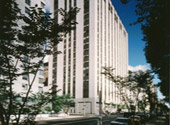
The NCI-designated Memorial Sloan-Kettering Cancer Center is dedicated to providing patients with the latest innovations in lung cancer care, from early detection to promising experimental treatment options. The world’s oldest and largest private cancer center, Memorial Sloan-Kettering boasts more than one hundred years of groundbreaking cancer research and patient care. This long reputation for scientific excellence has earned the center a Comprehensive Cancer Center designation by the National Cancer Institute. The hospital offers a Lung Cancer Survivorship Program, part of an institution-wide survivorship initiative that provides palliative treatments and lifelong follow-up care.
One of the first women in the nation to become board certified in thoracic surgery, Valerie Rusch has more than 25 years of experience diagnosing and treating patients with cancers of the lung. Rusch offers minimally invasive techniques like VATS (video-assisted thoracic surgery) and the latest in robot-assisted surgery to minimize patient discomfort and shorten the length of hospital stays. She also uses minimally invasive techniques like EBUS (endobronchial ultrasound) and EUS (esophageal ultrasound) to stage her patients’ lung cancer and determine the extent of their tumors without requiring an incision.
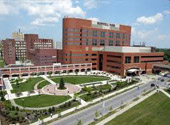
Located on a 25 acre campus in downtown Buffalo, Roswell Park Cancer Institute (RCPI) is the only NCI-designated comprehensive cancer center in upstate New York. RCPI was founded in 1898 by Roswell Park, whose multi-disciplinary approach to cancer treatment became the standard of care for all modern comprehensive cancer centers. The Roswell Park Cancer Institute has distinguished itself as a leader in a variety of alternative and experimental lung cancer treatments, including surgical robotics, immunotherapy and vaccine therapy. The institute also offers the LIFE (Laser-Induced Fluorescence Endoscopy) imaging system, which has been proven to double your doctor’s ability to locate tiny surface cancers of the airway.
As Chair of the Department of Thoracic Surgery at Roswell Park Cancer Institute, Todd Demmy sets high standards for cancer care. Demmy’s areas of expertise include lung cancer, mesothelioma and esophageal cancer. His specific research interests include minimally invasive thoracic surgery, post-surgical pain management and quality of life issues, regional lung chemotherapy and the management of pleural effusions. Demmy has also earned nearly $1.5 million in research grants for his institution, more than $100,000 of which was contributed toward lung cancer research.

The NYU Langone Medical Center is home for researchers at Cancer Institute (NYUCI), who excel at translating laboratory discoveries into groundbreaking innovations in cancer treatment and patient-centered care. Lung cancer patients at NYUCI, an NCI-designated cancer center, gain access to the latest therapies and clinical trials, as well as a variety of programs in cancer prevention, screening, diagnostics and supportive services. Teams of multi-disciplinary doctors meet weekly to discuss the lifestyle and needs of individual patients, allowing them to create highly personalized cancer care plans. The NYU Cancer Institute’s thoracic oncology team specializes in patients with almost any abnormality of the chest, specifically those who are ineligible for surgery and wish to participate in a clinical trial.
A longtime innovator in his field, Dr. Harvey Pass boasts more than 30 years of experience as a board-certified thoracic surgeon. Pass is currently the Chief of Thoracic Surgery at NYU Langone, where he is known for his expertise in minimally invasive lung cancer surgery techniques like video-assisted thoracic surgery (VATS) and robot-assisted thoracic surgery. For many years, Pass has helped raise awareness about the dangers of asbestos and the diseases it can cause. His laboratory at Bellevue Hospital houses the NCI-funded Early Detection Research Network Biomarker Discovery Laboratory for Mesothelioma, and the Clinical CORE for the Mesothelioma Pathogenesis Program Project, also funded by the National Cancer Institute.


The Division of Thoracic Surgery at Mount Sinai Hospital has countless contributions toward bettering our understanding of lung cancer and its safest, most effective treatments. The lung cancer division is led by Raja M. Flores, M.D., the creator of and leading international expert on a minimally invasive lung cancer surgery technique known as VATS lobectomy. Compared to traditional surgery techniques, this video-assisted procedure offers fewer complications and a shorter hospital stay with equal cancer recurrence and survival rates. Other cutting edge lung cancer treatments at Mount Sinai include robotic surgery, minimally invasive biopsies and targeted therapies based on the patient’s DNA. Flores also offers his expertise to Mount Sinai’s Sleikoff Center for Occupational and Environmental Medicine, diagnosing and treating asbestos-related diseases like lung cancer and mesothelioma.
Flores is a renowned thoracic surgeon, well-recognized for his commitment to advancing the quality of lung cancer and mesothelioma treatments. Currently serving the Mount Sinai Medical Center as Chief of the Division of Thoracic Surgery and Ames Professor of Cardiothoracic Surgery, Flores specializes in minimally invasive surgery techniques for lung cancer and mesothelioma.
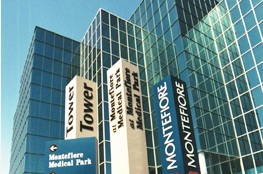
The Montefiore Einstein Center for Cancer Care is internationally recognized for its position at the forefront of creative innovations in the prevention and treatment of lung cancer. With the support of its research partner, the NCI-designated Albert Einstein Cancer Center, Montefiore strives for translational research that improves technology and develops more effective cancer therapies. The state-of-the-art facilities at the Montefiore Einstein Center for Cancer Care allow new breakthroughs to quickly transition from the laboratory to testing via clinical trials. New developments in effective and convenient therapies are commonplace. Montefiore is currently researching lung cancer treatments that can be administered orally, inhaled or directly absorbed by the lungs, new methods that could completely revolutionize the standard approach to cancer care.
A native of Spain, Roman Perez-Soler completed his fellowship in medical oncology at the M.D. Anderson Cancer Center and went on to become chairman of the Department of Oncology and chief of the Division of Medical Oncology at Montefiore Medical Center. Perez-Soler is considered an international expert in experimental cancer therapy. In an effort to advance the diagnosis and treatment of lung cancer, Perez-Soler has led a wide range of clinical studies focused on combining various chemotherapy drugs. Some of his discoveries have resulted in notable success, such as treating lung cancer with a combination of liposome-entrapped cisplatin analog and erlotinib.
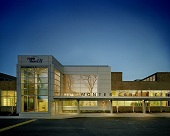
One of the largest cancer centers in the New York metropolitan area, the Cancer Institute at North Shore-LIJ is dedicated to offering the most recent advances in the prevention, early detection and treatment of all stages of lung cancer. The cancer institute’s thoracic surgeons are well-trained in minimally invasive techniques like radiofrequency ablation, which is known to decrease recovery time and extend the survival rate and quality of life for patients with inoperable lung tumors. It is also houses one of the most comprehensive radiation facilities in the nation. Advanced techniques like stereotactic body radiation therapy and image guided radiation therapy precisely target lung tumors while minimizing the side effects commonly associated with standard radiation treatments.
A member of North Shore University Hospital’s Division of Thoracic Surgery since 2007, Kevin Hyman offers his expertise in the latest lung cancer surgery techniques. Hyman has published articles in a variety of peer-reviewed journals, including the Journal of Thoracic and Cardiovascular Surgery and the Journal of Clinical Immunology and Immunopathology. One of his articles touted a novel diagnostic technique known as electromagnetic navigational bronchoscopy, in which electromagnetic guidance assists surgeons in the collection of biopsy samples and the staging of lung cancer.
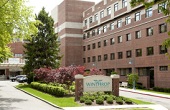
The Lung Cancer Program at Winthrop’s Institute for Cancer Care offers a range of traditional and innovative services for lung cancer patients and those at high-risk for developing the disease. A major focus of the institute is providing comprehensive care that takes each patient’s anxieties and fears into consideration. In addition to traditional lung cancer treatment options, Winthrop offers patients cutting edge therapies including radiofrequency ablation, robot assisted VATS lobectomy and high-tech endoscopic bronchial ultrasound (EBUS). Winthrop is also one of the few medical institutions in the country to offer the CyberKnife treatment, a targeted radiation therapy that can treat tumors considered otherwise untreatable or impossible to reach.
Since 1990, Alexander Hindenburg has served Winthrop-University Hospital as an attending medical oncologist. Noted for his contributions to both clinical and basic cancer research, Hindenburg has received more than $500,000 in research funds from the American Cancer Society throughout the course of his career. Before joining Winthrop, Hindenburg was an Assistant Professor of Medicine and Co-Director of the Oncology Unit at Colombia Presbyterian Medical Center.

Upstate University Hospital’s Thoracic Oncology Program (TOP) is the only service of its type in Central New York. In just one appointment, patients can meet a team of specialists representing thoracic surgery, medical oncology, radiation oncology, thoracic radiology, pulmonary medicine and cytopathology. TOP patients can expect the latest in multi-modality treatments, with options including surgery for high-risk patients, advanced image-guided needle biopsy, robotic surgery and photodynamic therapy. Surgeons at Upstate University Hospital have performed more than 100 VATS lobectomies, which use video cameras and small incisions for lung cancer surgery. This treatment center also offers the shortest length of stay for major lung cancer surgery in Central New York.
Leslie Kohman has worked for the Upstate University Hospital for 28 years, serving most of her time there as a thoracic surgeon treating patients with surgical lung cancer problems. Kohman chose her specialty in thoracic surgery because it allows her to make fast decisions while treating patients, and in some cases completely cure lung cancer patients with one surgical procedure. Her research interests include all aspects of thoracic oncology and lung cancer. Kohman has contributed to nearly 100 peer-reviewed journal articles, 26 of which dealing explicitly with the topic of lung cancer.
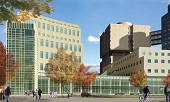
The Lung Cancer Evaluation Center at Stony Brook University uses the latest in technology to provide patients with advanced diagnostics, comprehensive treatments and a full range of support and follow-up services. Stony Brook has also been granted a three-year Teaching Hospital Cancer Program accreditation by the American College of Surgeons Commission on Cancer, a testament to the facility’s high quality of care. The Stony Brook Cancer Center’s expert Lung Cancer Team takes a coordinated multi-disciplinary approach to treatment. Five-year evaluations of the newest lung cancer treatments available at Stony Brook have recently become available, and the results are highly favorable. Some examples of these minimally invasive treatments include radiofrequency ablation, cryoablation, image-guided radiotherapy and VATS lobectomy.
Your web browser is no longer supported by Microsoft. Update your browser for more security, speed and compatibility.
If you are looking for mesothelioma support, please contact our Patient Advocates at (855) 404-4592
